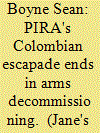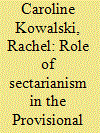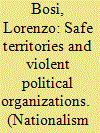|
|
|
Sort Order |
|
|
|
Items / Page
|
|
|
|
|
|
|
| Srl | Item |
| 1 |
ID:
020597


|
|
|
|
|
| Publication |
Dec 2001.
|
| Description |
25-27
|
|
|
|
|
|
|
|
|
|
|
|
|
|
|
|
| 2 |
ID:
165045


|
|
|
|
|
| Summary/Abstract |
Can nonstate militants professionalize? That is the core question of this piece. Discussions of professionalism have spread to the state military from civilian professions such as education, medicine, and law. This piece examines whether nonstate actors exhibit the same fundamental processes found within these state-based organizations. These fundamentals are the creation of a recognized internal ethos, which acts as a collective standard for those involved. A commitment to expertise and the punishment of those who do not reach these collective expectations reinforce this ethos. To answer this question, this piece examines the development of the Provisional Irish Republican Army (PIRA) during the Troubles. It highlights consistencies and inconsistencies with traditional forces and argues that groups like the PIRA can professionalize and increase their effectiveness in doing so. This widens the field of professionalism studies and provides an additional lens through which to examine nonstate groups.
|
|
|
|
|
|
|
|
|
|
|
|
|
|
|
|
| 3 |
ID:
013534


|
|
|
|
|
| Publication |
Autumn 1997.
|
| Description |
1-32
|
|
|
|
|
|
|
|
|
|
|
|
|
|
|
|
| 4 |
ID:
163193


|
|
|
|
|
| Summary/Abstract |
This article concerns the nature of political violence in an ethnonationally divided society. The article engages with the debates surrounding the discrimination employed, or not, by the PIRA when selecting their targets and waging their campaign against British rule and partition in Ireland between 1969 and 1997. The piece challenges the assertion that the PIRA discriminated with religious bias, and that they actively targeted Protestant civilians. It does so by drawing upon analysis of original data collected for the piece, corroborated with qualitative primary sources including the memoirs of former PIRA members, and the sentiments of a former PIRA member turned informer, Sean O’Callaghan, who agreed to be interviewed for the piece. It is argued that the PIRA aimed only to kill individuals whom they deemed to be in some measure actively responsible for the persistence of British control in Ireland, and the prevention of a reunion with the Republic; and did so in a fashion that was, for the most part, blind to religious diversity. It is also argued, however, that the PIRA were either unable or unwilling to recognise the gap between the actual impact of their “armed struggle” and the intentions that lay behind it.
|
|
|
|
|
|
|
|
|
|
|
|
|
|
|
|
| 5 |
ID:
127692


|
|
|
|
|
| Publication |
2013.
|
| Summary/Abstract |
This article assesses how the concept of safe territory can expand our understanding of the persistence of, and eventual disengagement from, violence by violent political organizations. The explanatory utility of this concept is demonstrated through an analysis of the cycles of political violence perpetrated by the Red Brigades in Italy and the Provisional Irish Republican Army in Northern Ireland. This work offers two main illustrative hypotheses. First, the opportunities provided by safe territories are not necessarily conducive to the continuation of political violence, although they facilitate its persistence over a long period of time. Second, the presence of safe territories, regardless of the ideology of the violent political organization, tends to enforce disengagement from political violence at the group, rather than the individual, level. Finally, the analytical intent in introducing the concept of safe territory is to contribute to spatial understandings of political violence.
|
|
|
|
|
|
|
|
|
|
|
|
|
|
|
|
| 6 |
ID:
154971


|
|
|
|
|
| Summary/Abstract |
This article provides an overview of Provisional Irish Republican Army (PIRA) innovations with regards to improvised explosive devices (IEDs). It situates PIRA's tactical innovations within the broad organizational psychology literature focused on the nature and drivers of creativity and innovation. This discussion helps frame the two empirical analyses that follow. The first analysis provides a graphical timeline of PIRA's radical innovations (and their drivers) in relation to IED technology. This helps provide a sense of the specific occasions in which PIRA innovations were numerous and when they were sparse. The second analysis looks at the locations in which PIRA radical innovations debuted. This provides us with an understanding of the specific PIRA units responsible for these innovations. The results demonstrate that while PIRA operations spanned the six counties of Northern Ireland for 29 years, radical IED innovations were conceived, developed, and initially implemented within only two areas of operations for only seven of those years.
|
|
|
|
|
|
|
|
|
|
|
|
|
|
|
|
| 7 |
ID:
125104


|
|
|
|
|
| Publication |
2013.
|
| Summary/Abstract |
The Provisional Irish Republican Army (PIRA), one of the best known and most researched terrorist organizations in history, has been comparatively assessed alongside various terrorist outfits from around the world. However, it has never been systematically compared with its most immediate rival, neighbour, and competitor, the lesser known Official Irish Republican Army (OIRA). This article addresses this scholarly gap and presents a thematic assessment of the similarities and differences between the two organisations in their respective post-ceasefire periods of 1972 and 1994. It proposes a new comparative approach to studying terrorist organisations in which knowledge about a better known entity (here, the PIRA) and its future trajectory is generated through a detailed assessment of the activities and developments of a not only more obscure case (here, the OIRA) but also, in many aspects, the most comparable case or cases. Such an approach could yield interesting results for the field of terrorism studies, which could still profit from in-depth, internal, case study analyses of specific terrorist organizations.
|
|
|
|
|
|
|
|
|
|
|
|
|
|
|
|
|
|
|
|
|